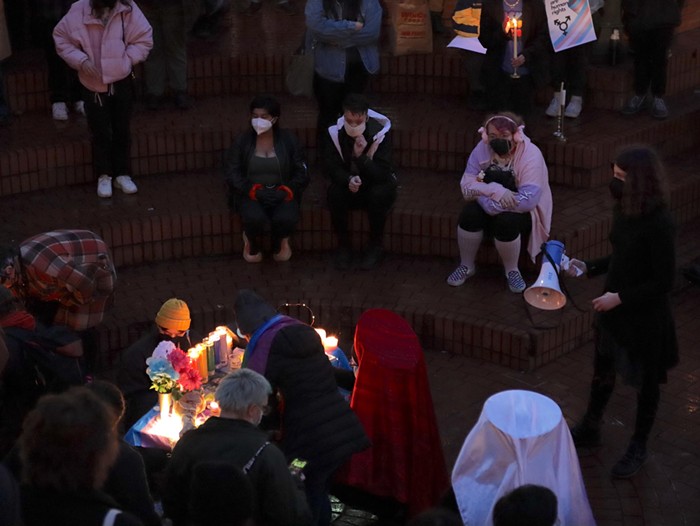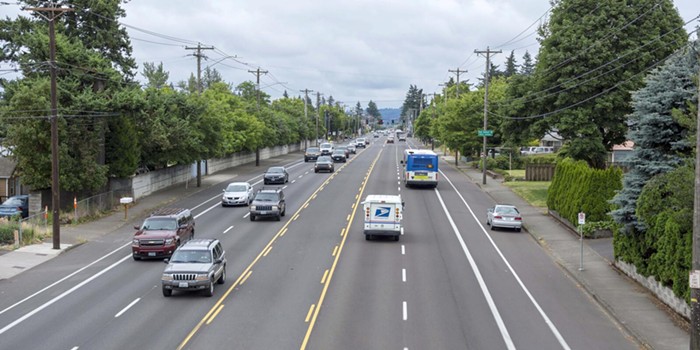Over 150 Portlanders gathered for a vigil Tuesday evening at Pioneer Courthouse Square to mourn the death of Nex Benedict, a non-binary youth from Owasso, Oklahoma who died the day after being assaulted by classmates at their high school.
Police originally said a preliminary autopsy indicated Benedict “did not die as a result of trauma,” but a fight shortly before Benedict’s death sparked skepticism of this conclusion. On February 27, Owasso police clarified the fight was not ruled out by the medical examiner’s office as a contributing factor in Benedict’s death.
“To me it seems entirely like negligence across the board,” Austin Pryfogle, a non-binary organizer of Tuesday’s community vigil, said. “The hospital shouldn't have sent Nex home. The high school should have sent Nex to the hospital immediately. There is a standard of care that we are supposed to have with our students, with our young people, and none of it was followed and it is specifically because of [Nex’s] identity.”
Community members lit candles and circled around a display including a photo of Benedict that said “Protect Trans Youth.” Speakers mourned Benedict’s passing with peaceful speeches and made calls to action.
Esmée Silverman, a non-binary community activist and co-organizer of the vigil, specifically offered to create a Safe Schools Program for LGBTQ+ students in Oklahoma. According to Silverman, a Safe Schools Program would involve LGBTQ+ youth from around the state coming together for a summit to learn how to make schools safer, then taking this knowledge back to their localities.
While Portland is typically seen as a safer place for the LGBTQ+ community than a state like Oklahoma, which has passed a slew of anti-trans legislation, there are still serious concerns for many here in the local area.
“I mean, you could ask any queer trans person here, do you feel safe walking around at night?” Silverman said. “You're gonna get a decent majority of them saying no… Sure, you're in a city like Portland, Oregon, but like all cities, we're not immune to violence or rhetoric against queer and trans people.”
LGBTQ+ people in Oregon still faces a number of challenges, particularly at the local level, according to Blair Stenvick, communications manager with Basic Rights Oregon.
“We hear on a regular basis from all over the state, instances of storytime drag shows being canceled because of police threats, school board meetings being kind of overtaken by a loud minority of parents who don't want pronouns respected at school,” Stenvick said.

after a school fight, has renewed the focus on LGBTQ+ youth. kevin foster
Stenvick noted the Oregon GOP walkout in 2023, related in-part to HB 2002 that expanded access to abortion and gender-affirming healthcare, as a sign that there’s been a paradigm shift among politicians in Oregon.
“For a long time in Oregon, even politicians who didn't necessarily support things like gay marriage or non-discrimination, I think they did not make it a signature issue because they understood that it was the will of a majority of Oregonians to have equality and they wanted to focus on other issues where their agenda could progress,” Stenvick told the Mercury. “As the Oregon GOP becomes more extremist in a lot of ways… I think they're looking at, unfortunately, how nationally this has become an easy issue to define people over, get press attention and get donations.”
Basic Rights Oregon recently released a guide for Oregonians to find resources and honor Benedict in the wake of the teen's death.
Benedict’s death, along with the GOP’s rhetoric, have shaken the queer community, but there are still glimmers of hope.
“I think that there's a bubble here in Portland and it's a beautiful bubble,” Pryfogle said. “This is the queerest place, the most welcoming and affirming place I have lived in my entire life. And as a queer person, it's deeply euphoric to be here, but as soon as you exit maybe 30 to 45 minutes outside of town, it gets dicey again.”
With acts of violence against trans and non-binary youth on the mainstage with Benedict’s death, queer residents hope for community and accountability.
“Portland has a very vibrant community that looks out for and cares for one another,” Silverman said. “People are truly coming out for one another right now. And that's what gives me a lot of hope.”



















